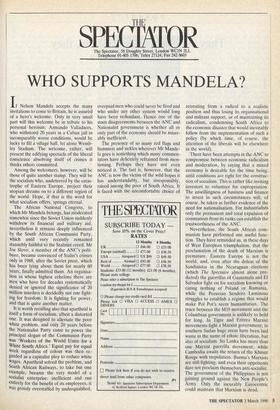SPECT TFL AT OR
The Spectator, 56 Doughty Street, London WC1N 2LL Telephone 01-405 1706; Telex 27124; Fax 242 0603
WHO SUPPORTS MANDELA?
f Nelson Mandela accepts the many
invitations to come to Britain, he is assured of a hero's welcome. Only iri very small part will this welcome be in tribute to his personal heroism: Armando Valladares, who withstood 20 years in a Cuban jail in incomparably worse conditions, would be lucky to fill a village hall, let alone Wemb- ley Stadium. The welcome, rather, will present the edifying spectacle of the liberal conscience absolving itself of crimes it
thinks others committed. .
Among the welcomers, however, will be those of quite another stamp. They will be the socialists Who, undeterred by the catas- trophe of Eastern Europe, project their utopian dteams on to a different region of the world. Hope, if that is the word for what socialism offers, springs eternal.
The African National Congress, to Which Mr Mandela belongs, has moderated somewhat since the Soviet Union suddenly withdrew, its financial and military aid, nevertheless it remains deeply influenced by the South African Communist Party, which until very recently remained staunchly faithful to the Stalinist creed. Mr Joe Slovo, a member of the ANC's polit- buro, became convinced of Stalin's crimes only in 1988, after the Soviet press, which has been lying about them for nearly 60 years, finally admitted them. An organisa- tion in whose highest echelons there are Men who have for decades systematically denied or ignored the significance of 20 million murders is decidedly not one fight- ing for freedom. It is fighting for power, and that is quite another matter.
It is worth recalling also that apartheid is itself a form of socialism, albeit a distorted one. It was designed to alleviate the poor White problem, and only 20 years before the Nationalist Party came to power the principal slogan of the Communist Party was 'Workers of the World Unite for a White South Africa.' Equal pay for equal work regardless of colour was then re- garded as a capitalist ploy to reduce white wages. Apartheid solved the problem, and South African Railways, to take but one example, became the very model of a socialist enterprise: inefficient and run entirely for the benefit of its employees, it was grossly overstaffed by underqualified, overpaid men who could never be fired and who under any other system would long have been redundant. Hence one of the main disagreements between the ANC and Nationalist government is whether all or only part of the economy should be Miser- ably inefficient.
The presence of so many red flags and hammers and sickles wherever Mr Mande- la goes is something which many commen- tators have delicately refrained from men- tioning. Perhaps they have not even noticed it. The fact is, however, that the ANC is now the victim of the wild hopes it has understandably, but irresponsibly, raised among the poor of South Africa. It is faced with the uncomfortable choice of retreating from a radical to a realistic position and thus losing its organisational and militant support, or of maintaining its radicalism, condemning South Africa to the economic disaster that would inevitably follow from the implementation of such a policy (by which time, of course, the attention of the liberals will be elsewhere in the world).
There have been attempts in the ANC to compromise between economic radicalism and moderation, by saying that a mixed economy is desirable for the time being, until conditions are right for the construc- tion of socialism. This is rather like inviting investors to volunteer for expropriation. The unwillingness of business and finance to invest in such circumstances will, of course, be taken as further evidence of the need for nationalisation. For industrialists only the permanent and total expulsion of communists from its ranks can establish the trustworthiness of the ANC.
Nevertheless, the South African com- munists have performed one useful func- tion. They have reminded us, in these days of West European triumphalism, that the proclamation of the death of Marxism is premature. Eastern Europe is not the world, and, even after the defeat of the Sandinistas in the Nicaraguan elections (which The Spectator almost alone pre- dicted) the guerrillas of Guatemala and El Salvador fight on for socialism knowing or caring nothing of Poland or Rumania, while the Peruvian Sender° Luminoso struggles to establish a regime that would make Pol Pot's seem humanitarian. The truce between the M19 movement and the Columbian government is unlikely to hold for long. In Tigre and Eritrea Marxist movements fight a Marxist government; in southern Sudan huge areas have been laid waste in the name of ethnic liberation, but also of socialism. Sri Lanka has more than one Marxist guerrilla movement, while Cambodia awaits the return of the Khmer Rouge with trepidation. Burma's Marxists are still fighting, and even their opponents dare not proclaim themselves anti-socialist. The government of the Philippines is not gaining ground against the New People's Army. Only the incurably Eurocentric could maintain that Marxism is dead.


























































 Previous page
Previous page